Iraq
war & Consequences for Africa
Irak-Krieg &
Konsequenzen für Afrika
|
|
 |
|
| |
05.04.03
 |
Mbeki: Africa to be the
next Iraq?
Mbeki: Ist Afrika das nächste
Irak? |
|
| |
South African President
Thabo Mbeki has warned that Africa could face a
similar fate to Iraq if it is seen to be acting
against democratic principles.
He said that the United States and Britain have
maintained that they are waging war on Iraq
because it is undemocratic and has not
sufficiently accounted for weapons of mass
destruction. This stance should make Africa
"uneasy", he told delegates at a
conference on African democracy in Pretoria. He
however asked participants to take a look at how
democracy worked and how it should be applied on
the continent. But he insisted that democracy had
to be home grown and practised within a country's
social context and not imported from abroad.
"Presumably the argument is that whether a
person ingests jollof rice (a west African dish)
voluntarily or does so because he or she is force-fed,
the fact remains that they have eaten jollof rice."
"I am not certain that the institution of a
democratic system can be approached in the same
way that we approach the consumption of jollof
rice," the South African leader said. |
|
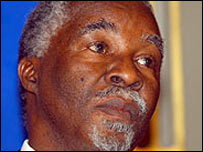
"If the UN does not matter why should we,
the little countries of Africa that make up the
African Union, think that we matter and will not
be punished if we get out of line?"
South Africa President, Thabo Mbeki
 |
| |
|
|
|
| Südafrikas
Präsident Thabo Mbeki hält es für möglich, dass in
Afrika das gleiche passieren könnte wie im Irak. Die USA
und Grossbritannien könnten unter dem Vorwand,
demokratische Prinzipien schützen zu wollen, ähnlich
gegen afrikanische Länder vorgehen. Bei einer Konferenz
zum Thema "Afrikanische Demokratie" in Pretoria
beharrte Mbeki darauf, dass Demokratie jedoch in jedem
Land vor dem Hintergrund eigener sozialer Verhältnisse
wachsen müsse und nicht von aussen importiert werden dürfe. |
| |
| |
05.04.03
 |
"Bush Against
War" - Campaign of a Cape Town Radio
"Bush gegen
Krieg" - Radio-Kampagne in Kapstadt |
|
| |
 Bush
is against the war in Iraq, and wants everyone to
know it. Bush
is against the war in Iraq, and wants everyone to
know it.
No it's not United States president George Bush
who's against the coalition attacks, but a
community radio station in Salt River, Cape Town,
employing a novel tactic to spread its anti-war
message - by playing John Lennon's Give Peace A
Chance for 48 hours this week.
Programming at Bush Radio 89.5FM was suspended on
Tuesday in favour of the 1972 song, with only
hourly news and anti-war comments from listeners
broadcast between the 4-minute 20-second track.
At an outside broadcast on Thursday protesters
wearing "Bush Against War" T-shirts
lined the pavement at the station's Salt River
studios strains of Lennon's famed
mantraencouraging motorists to hoot for peace to
the strains of Lennon's famed mantra. |
|

Bush gegen den Irak-Krieg?
Nein, es ist nicht der amerikaische Präsident,
sondern die lokale Station "Bush Radio"
im südafrikanischen Kapstadt. Sie spielte aus
Protest gegen den Irak-Krieg 48 Stunden lang John
Lennon's Friedenssong "Give Peace A Chance".
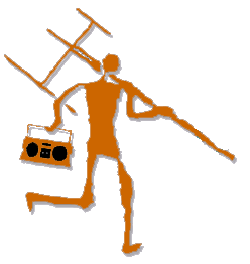 |
Access to Bush
Radio
Zugang zum
Bush Radio |
|
| |
|
|
| Media Institute of
Southern Africa |
|
"The
national colours are flying on the air waves as
pro-war reporting takes its toll on journalism
ethics. The ethical spectrum is no longer
measured from objectivity to subjectivity but
from patriotism to objectivity. In this
situation, is it not equally wrong for
broadcasters to direct their media against the
war?..." |
|
| |
| |
02.04.03
 |
Africa Agrees to
Disagree On Iraq
Afrika ist sich
einig, in Sachen Irak uneinig zu sein |
|
| |
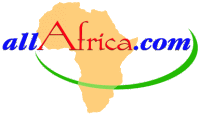 |
|
"Now
that the war in Iraq is going full-blast, was it
a mistake for most of Africa to opt out of the
Anglo-AmericanAustralian "coalition of the
willing" (or "COW" as US Senator
Robert Byrd calls it)? Was it a mistake for
Pretoria to take the lead in aligning Africa with
France, Russia and China in their security
council opposition to the US and Britain on Iraq?..." |
| |
|
|
| |
|
In
einem Meinungsartikel der Johannesburger Zeitung
"Business Day" fragt Francis Kornegay,
ob es ein Fehler für die meisten afrikanische
Staaten war, sich nicht der amerikanisch-britischen
Koalition gegen den Irak anzuschliessen. Kornegay
ist Programm-Koordinator des Zenrums für Afrikas
Internationale Beziehungen an der, Universität
von Witwatersrand. |
|
| |
| |
28.03.03
 |
African Prisoners
of War in Iraq freed
Afrikanische
Kriegsgefangene im Irak befreit |
|
| |
| Two Kenyans taken
prisoner by Iraqi gunmen and shown on Arabic
television have spoken about their 10-day ordeal
after being rescued by British soldiers.
David Shira Mukaria, 53, and Jakubu Maina Kamau,
37, said their captors argued about whether to
kill them. They were taken prisoner in the town
of al-Zubayr, near the southern city of Basra,
and their faces broadcast on satellite network al-Jazeera.
UK troops found them gagged, bound and alone in a
building on Monday after securing the town. Die
beiden Kenianer, die als Kontrakt-LKW-Fahrer der
britischen Armee im Irak in Gefangenschaft
geraten waren, sind nach 10 Tagen von britischen
Soldaten in einem aufgegebenen Gebäude
unversehrt gefunden worden.
|
|
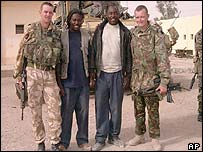
 |
|
| |
| 28.03.03 |
|
|
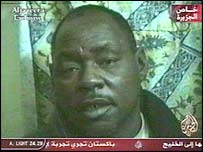
 |
|
Two
men captured by Iraq and shown on TV are civilian
lorry drivers employed to deliver food to Iraqi
prisoners of war, the Ministry of Defence has
said. An MoD spokeswoman
told BBC News Online the drivers - who are
thought to be Kenyans - were sub-contractors to
the British Army working through an unnamed
company in Saudi Arabia. She said they had been
part of a convoy with a military escort, but had
become separated after it was halted by a "civil
disturbance". Die
britische Armee hat für den Krieg im Irak
Afrikaner als LKW-Fahrer angeworben. Zwei Männer,
angeblich aus Kenia, wurden von irakischen
Truppen als Kriegsgefangene genommen.
|
|
| |
| |
| 28.03.03 |
 |
Funding Crisis for
Africa Anticipated
Weniger Hilfe für
Afrika erwartet |
|
| |
 |
|
| "As
cash is poured into the war with Iraq and
its aftermath, the world could soon be
confronted by a humanitarian funding
crisis graver than any since the end of
the Second World War. A
worsening emergency is engulfing Africa,
where aid flows have slowed to a tiny
portion of what is required..." |
|
 |
| |
|
|
| "Es
sind nicht nur der Irak und seine
Nachbarstaaten, die unter den Folgen des
Krieges leiden werden. Viele
Entwicklungshelfer befürchten, dass sich
der Krieg am Golf auch auf die
wirtschaftliche Entwicklung Afrikas
auswirken könnte. Denn Gelder der Geberländer
könnten in Zukunft zuerst für
die humanitäre Hilfe und den
Wiederaufbau des Iraks verwendet werden.
Für Afrika wird da immer weniger übrig
bleiben..." |
|
 |
|
|
| |
| |
| 28.03.03 |
 |
A Word of
Traditional Wisdom from South Africa
Ein Wort
traditioneller Weisheit aus Südafrika |
|
| |
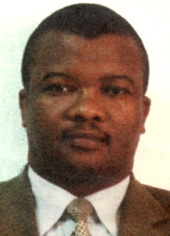 
|
|
If Bush Intends to Be
Headman of Global Village,
Villagers Need a SayBusiness Day (Johannesburg)
March 26, 2003
by Holomisa A! Dilizintaba
...Bush
has declared himself the global village headman,
with his fellow British descendents, Tony Blair
and John Howard of Britain and Australia, his
subheadmen. Having illegally usurped the power of
the United Nations (UN), the three men believe
they bear the responsibility to relieve Iraqis of
their president by invading their land,
destroying property, driving them from their
homes and killing a number of them.
I have not
heard the people of Iraq requesting the UN to
help them oust their president. They did not ask
the US, Britain or Australia to do so either.
Blair and
Howard were elected to rule the people of Britain
and Australia. When the US voters could not
decide between Al Gore and George Bush the judges
of the State of Florida appointed Bush. None of
them was elected to rule Iraq or other states.
A village
headman is elected by the people over whom he is
to rule. If Bush wants to be the global village
headman, the villagers should have a say in the
formulation of the system which endows him with
power to run their lives.
If being US
president empowers Bush to rule the world, every
global villager must have a say in his election...
Holomisa (A! Dilizintaba)
is an ANC MP and president of the Congress of
Traditional Leaders of SA. He writes in his
personal capacity.
|
| |
|
|
| |
|
Der
Präsident des Kongresses Traditoneller Führer
in Südafrika, Holomisa, der zugleich für den
ANC im Parlament sitzt, hat in einem Beitrag für
die Johannesburger Zeitung "Business Day"
traditionelles afrikanisches Denken auf den Führungsanspruch
der Amerikaner und Briten im Irak-Konflikt
angewandt. Er schrieb u.a.:
"Das Oberhaupt eines
Dorfes wird von jenen gewählt, die er regieren
soll. Wenn Bush Oberhaupt des globale Dorfes
werden will, sollten die Dorfbewohner bei der
Festlegung jenes Systems mitbestimmen können,
das ihm die Macht gibt, ihr Leben zu organisieren.
Wenn aber allein die Tatache, amerikanischer Präsident
zu sein, Bush die Macht gibt, die Welt zu
regieren, dann muss jeder globale Dorfbewohner
bei seiner Wahl mitbestimmen können." |
|
| |
| |
| 21.03.03 |
 |
African reactions
to the beginnig of war in Iaq
Afrikanische
Reaktionen zum Kriegsbeginn im Irak |
|
| |
There have been negative
reactions across Africa to the start of the US-led
war against Iraq.
Der von den USA
begonnene Irak-Krieg hat in Afrika zu überwiegend
negativen Reaktionen geführt. |
|
|
|
| |
| |
| 20.03.03 |
 |
"Human
Shields" from South Africa rush to Iraq
"Menschliche
Schutzschilde" von Südafrika nach Irak |
|
| |
|
|
 30 South African anti-war
campaigners want to be human shields in Iraq.
"Now it looks like we'll have to go overland
straight away because the Americans could start
bombing tonight." Mr Reddy and his
colleagues face a gruelling 12-hour journey from
the Jordanian capital, Amman, to Baghdad. There
they will join hundreds of other volunteer human
shields taking up positions at civilian
infrastructure installations. 30 South African anti-war
campaigners want to be human shields in Iraq.
"Now it looks like we'll have to go overland
straight away because the Americans could start
bombing tonight." Mr Reddy and his
colleagues face a gruelling 12-hour journey from
the Jordanian capital, Amman, to Baghdad. There
they will join hundreds of other volunteer human
shields taking up positions at civilian
infrastructure installations.
30 Südafrikaner haben sich
auf den Weg gemacht, um im Irak durch ihre
Anwesenheit Menschen in zivilen Einrichtungen zu
schützen. |
|
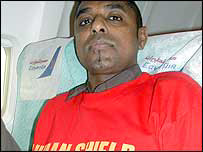
Human shield Reggie Reddy |
| |
|
|
"As human shields, I
don't think we can avert war, but we all feel
it's what we have to do to help the Iraqi people,"
says another member of the group, Ridwana Jooma.
Ms Jooma says their experience as South Africans,
living through a long liberation struggle against
apartheid, has led them to side with victims of
injustice and oppression wherever they may be.
Vor allem ihre Erfahrungen
während der Apartheid in Südafrika habe sie
motiviert, sich mit Opfern von Ungerechtigkeit
und Unterdrückung zu solidarisieren. |
|
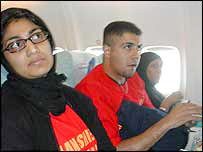
Human
shield Ridwana Jooma |
| |
|
|
| President Bush says once
Saddam Hussein is removed from power he wants
Iraq to become a democratic country. But Iraq
contains several ethnic and religious groups that
have a history of not getting along, such as the
Kurds, Sunni and Shiites. Zanethemba Mkalipi is a
researcher with the Institute for Democracy in
South Africa, known as IDASA. From Cape Town, he
spoke to English to Africa reporter Joe De Capua
about the challenges facing the creation of a
democratic Iraq. He says the Iraqi people must
not feel that democracy “is being imposed on
them by the United States.” He says even
before a new constitution is drawn up or
elections are held, the “psyche of the Iraqi
people” must accept democracy on their own
terms. To accomplish this, Mr. Mkalipi says, will
require the help of civil society and non-governmental
organizations, which he calls the “lifeblood
of a liberal democracy.” |
|
Ein
Mitarbeiter des Instituts für Demokratie in Südafrika,
IDASA, hat in einem VOA-Interview auf die
Notwendigkeit verwiesen, bei einer demokratischen
Neuordnung im Nachkriegs-Irak vor allem
zivilgesellschaftliche Gruppen und
Nichtregierungsorganisationen einzubeziehen.

|
|
| |
| |
09.03.03
 |
Youssou N'Dour
Cancels US Tour Over Threat of War
Youssou N'Dour sagt US-Tour
wegen Kriegsdrohung ab |
 |
|
| |
| |
05.03.03
 |
Heavy pressure
on African nations in UN-Security Council
Afrikanische Nationen im UN-Sicherheitsrat unter
Druck |
|
| |
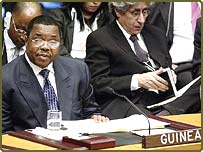
Participate
in the BBC's Internet-discussion:
How
should African Security Council nations vote? |
|
Guinea
has assumed the rotating presidency of the United
Nations Security Council just as crucial
decisions are being made about a war with Iraq. Heavy
pressure is being exerted on the three African
countries presently serving as non-permanent
members on the Security Council.
At last month's summit in France, Angola,
Cameroon and Guinea signed up to the French
position which calls for more time for the
inspectors. Top American and British officials
have visited the three countries to try to
convince them to vote in favour of military
action.
 |
| |
|
|
Derart umworben wird Afrika
selten.
Beim Ringen um eine diplomatische Koalition für
einen Irak-Krieg im UN- Sicherheitsrat machen die
USA drei Ländern des schwarzen Kontinents den
Hof: Angola, Guinea und Kamerun. Seit Anfang des
Jahres nichtständige Mitglieder, könnten die Länder
das Zünglein an der Waage zur völkerrechtlichen
Legitimierung eines Angriffs sein. Bislang sagen
die Afrikaner Nein zum Krieg. Doch
wirtschaftliche Verlockungen könnten ihre Linie
ins Wanken bringen. Den schwierigsten
Spagat muss zunächst Guinea meistern. Das
westafrikanische Land übernahm von Deutschland für
einen Monat den Vorsitz im Sicherheitsrat. Mit
der Übergabe ist das vornehmlich moslemische
Land mit einer heiklen Aufgabe konfrontiert. Außenminister
Francois Louceny Fall hat in der vergangenen
Woche erneut unterstrichen, dass Conakry eine
Fortsetzung der Waffeninspektionen im Irak begrüßen
würde.Die Anti-Kriegs-Haltung resultiert aber
weniger aus Einigkeit mit der ungeliebten Ex-Kolonialmacht
Frankreich. Guinea ist Mitglied der Organisation
der Islamischen Konferenz (OIC), und seine Bevölkerung
ruft nach Solidarität mit der arabischen Welt.
|
|

Auf
seinem Werbefeldzug durch Guinea, Kamerun und
Angola im Oktober 2002 machte der Afrika-Beauftragte
im US-Außenministerium, Walter Kansteiner, Guina
das Angebot zu einer neuen "Partnerschaft für
wirtschaftliche Entwicklung".
Die konzentriert sich aus amerikanischer Sicht in
erster Linie auf Öl. Die USA wollen ihre Abhängigkeit
von Importen aus dem Nahen Osten reduzieren. Öl-Lieferungen
aus Afrika sollen bis zum Jahr 2015 von heute 15
Prozent auf dann ein Viertel des US-Bedarfs
steigen. Für den Kontinent bedeutet das hohe
ausländische Investitionen. Allein der US-Konzern
ChevronTexaco will in den nächsten fünf Jahren
seine Investitionen in Afrika um ein Vierfaches,
von 5 auf 20 Milliarden US-Dollar, steigern.
 |
|
U.S.A. Discover
Africa As Source Of Oil
USA
entdecken Afrika als Erdöl-Quelle |
|
| |
|
|
| Vor allem ist den
Afrikanern klargemacht worden: erstens, dass der
Krieg sowieso kommt und sie ihn nicht verhindern
können, und zweitens, dass Hilfeleistungen vor
allem für Länder seien, "die keine Aktivitäten
unternehmen, die die US-Interessen der nationalen
Sicherheit oder Außenpolitik unterminieren".
Genauso steht es im so genannten Agoa-Gesetz, das
die Grundlage für amerikanische
Handelserleichterungen für afrikanische Staaten
ist. Und die drei Länder wurden auch daran
erinnert, dass die USA 1990 ein 70-Millionen-Dollar-Programm
für Jemen aufkündigten - wenige Tage nachdem
das Land im Sicherheitsrat gegen die US-Militäraktion
zur Befreiung Kuwaits stimmte. |
|

 |
|
Mandela: United States
of America - a Threat to World Peace
Mandela: USA - eine
Bedrohung für den Weltfrieden |
|
|
|